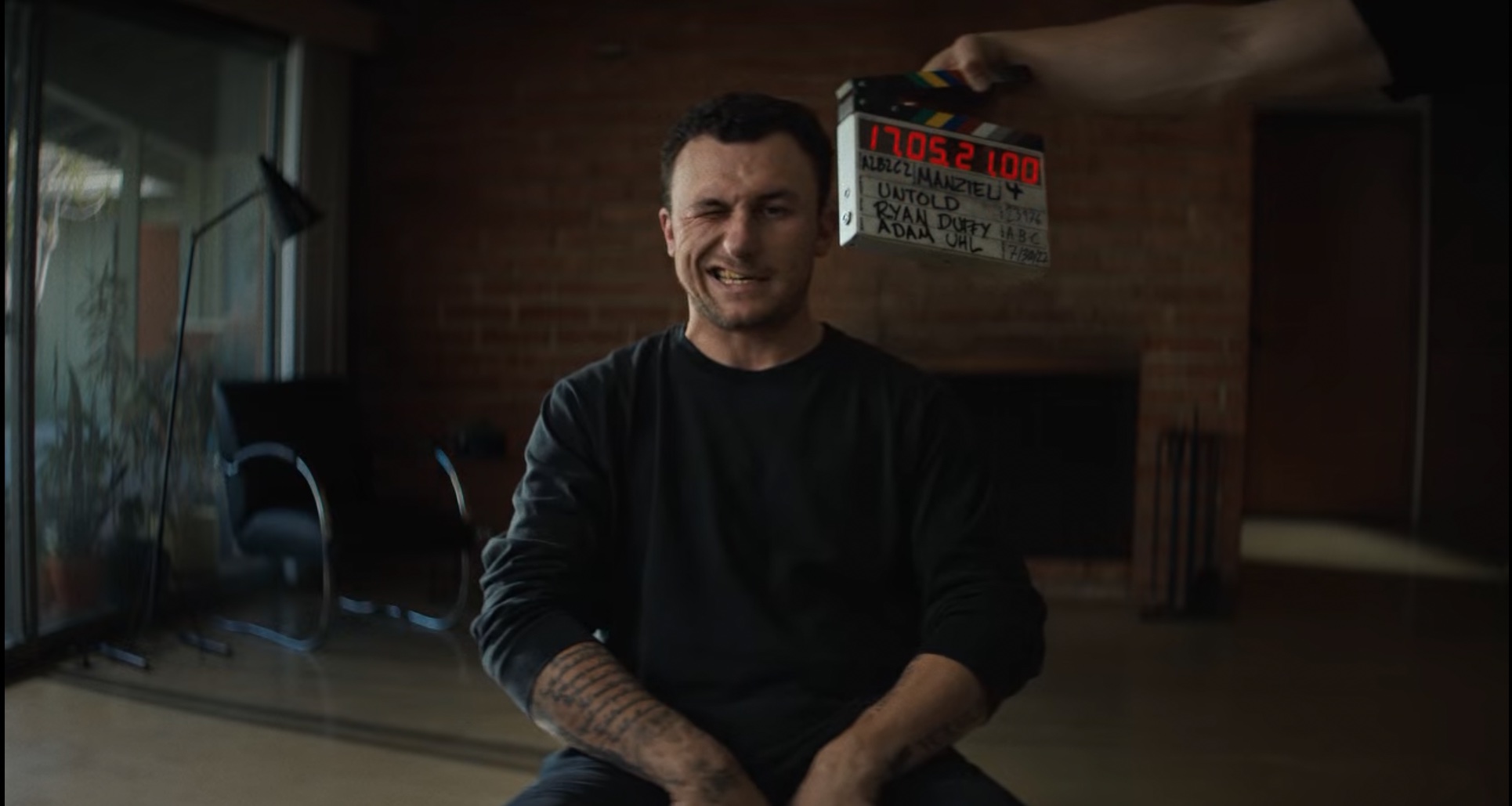Netflix's sports documentary series Untold has debuted a new episode on the rise and fall of Johnny Manziel, as told by Manziel himself and the people who were there. Untold: Johnny Football follows Manziel from his time playing high school football to his star making days at Texas A&M, to flaming out in Cleveland and all the ugliness that ensued afterwards and in between. Whatever you remember about "Johnny Football" at Texas A&M, it's clear from this doc that the story has actually been undersold a bit. Manziel was a kid who excelled at college football purely in an effort to maintain his partying and drinking habits on the weekends. He didn't prepare, or read the playbook, or even really work that hard; he was a talent that lived it up like a frat boy and College Station turned out to be a good environment to do just that.
Everyone in the doc agrees that everything changed for Manziel after leading Texas A&M to a win over Alabama in 2012. That took Manziel from star quarterback at A&M to Johnny Manziel, College Football Superstar. By the time he became the first freshman to win the Heisman Trophy he had become a full-fledged celebrity, and Manziel was absolutely up for taking advantage of all that entailed. He partied, he drank, he started signing autographs for money in order to fund the partying and drinking. He was suddenly buying Rolexes and Gucci wallets with his best friend/manager, he was partying at celebrity hotspots and riding private jets. He thumbed his nose at everything, most especially the NCAA, who demanded to be the only entity profiteering off the Manziel meteor. Even now, he stands by his deceit of the NCAA, which he views as a corrupt organization deserving no respect (broken clocks, you know).
Watching Johnny share his story now, it's clear to me that he was truly our first "scammer" quarterback. Not in the sense that his skills were a sham, but that he was a quarterback who lived to scam when possible. He was a guy who used his natural talents at football to live the "baller" lifestyle at 20: clubs, girls, and celeb photo ops, no different than your typical Miami credit card swiper or Wall Street hedge fund manager. He would have been very comfortable as an influencer, just the kind who could actually throw for five touchdowns in a single game. The doc is interesting if you're into scammer stories, certainly, but won't be for any other reason. Things naturally backfired on him when he got to the NFL, because even the most talented guy has to take the game at least a little seriously to survive. The scammer lifestyle always comes back to bite you in the ass and it came for Johnny in spectacular fashion. He bombed out on being Cleveland's next hope, he was addicted to cocaine and pain pills, the excessive drinking everyone excused at 20 became a problem at 25. He was suicidal and he alienated his friends, his management, his family, and, most seriously of all, he assaulted his ex-girlfriend. The case was eventually dismissed after he went through an NFL rehab program and anger management course.
If you're apprehensive to watch Untold: Johnny Football because you think it's a redemption narrative for Manziel, that's understandable. But I'm not sure that's what the doc is. Don't get it twisted: It's clear Manziel thinks it is. He thinks that simply retelling what happened is his atonement, but he seems to savor a chance to relive his glory days like he's Al Bundy. By the end of the documentary, the only thing that's certain is that Manziel understands he'll never play football again. His sister ends up accidentally making the most poignant remark about where he is in life, when she says that Manziel is "not ready to do anything in this world yet." That also includes coming to terms with his actual mistakes: he understands that he took football for granted and things got too dark there in the end, but that's really about it. There's not much remorse or reckoning, aside from the predictable sad puppy eyes and slow-motion shots of Manziel staring off into the distance. The first sign of trouble was when the documentary opened with him doing beer blasters with his friends at his home in Arizona. Far be it from me to tell someone how to handle their addictions, but when those addictions helped destroy your life and the lives of others, including the abuse of a person you claimed to love, perhaps that's a sign those addictions should end permanently. At the very least, maybe show some signs of moderation.
It's easy to have regrets, especially when a camera crew is shadowing you, but it's quite another thing to hold yourself responsible for those regrets. For all the reflection and interrogation on the Arc of Johnny Football, responsibility seems to be the one thing that is missing here. He is preening and smirking about everything he got away with like an overgrown Dennis the Menace, but when it comes to his actual addiction or the ways he harmed people and pushed away loved ones, he acts glum but does not show that he's worthy of the redemption he likely wants. Responsibility is nowhere to be found, just as it was nowhere to be found throughout his whole career. Until he comes to terms with that, all the tears and solemness mean nothing.






